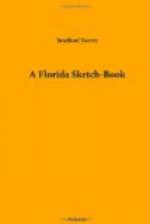More interesting, and a thousand times more memorable, than any flower or bird was the pine barren itself. I have given no true idea of it, I am perfectly aware: open, parklike, flooded with sunshine, level as a floor. “What heartache,” Lanier breaks out, poor exile, dying of consumption,—“what heartache! Ne’er a hill!” A dreary country to ride through, hour after hour; an impossible country to live in, but most pleasant for a half-day winter stroll. Notwithstanding I never went far into it, as I have already said, I had always a profound sensation of remoteness; as if I might go on forever, and be no farther away.
Yet even here I had more than one reminder that the world is a small place. I met a burly negro in a cart, and fell into talk with him about the Florida climate, an endless topic, out of which a cynical traveler may easily extract almost endless amusement. How abput the summers here? I inquired. Were they really as paradisaical (I did not use that word) as some reports would lead one to suppose? The man smiled, as if he had heard something like that before. He did not think the Florida summer a dream of delight, even on the east coast. “I’m tellin’ you the truth, sah; the mosquiters an’ sandflies is awful.” Was he born here? I asked. No; he came from B——, Alabama. Everybody in eastern Florida came from somewhere, as well as I could make out.
“Oh, from B——,” said I. “Did you know Mr. W——, of the —— Iron Works?”
He smiled again. “Yes, sah; I used to work for him. He’s a nice man.” He spoke the truth that time beyond a peradventure. He was healthier here than in the other place, he thought, and wages were higher; but he liked the other place better “for pleasure.” It was an odd coincidence, was it not, that I should meet in this solitude a man who knew the only citizen of Alabama with whom I was ever acquainted.




